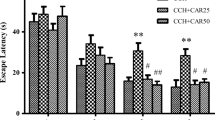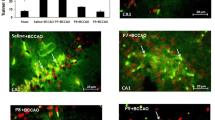Abstract
Purpose
Oxidative stress is known as the dominant factor in the damage caused by ischemia. Also, clinical studies have shown that the amount of folic acid decreases during ischemia. A decrease in folic acid is associated with an increase in homocysteine, which plays an important role in neurological disorders. In this study, folic acid was used to treat ischemic animals. The antioxidant role of folic acid is known. In addition, folic acid is able to reduce homocysteine level.
Methods
Forty male Wistar rats were divided into 4 groups: sham; CCH; and 2 CCH groups treated with folic acid 4 and 12 mg/kg. Chronic cerebral hypo-perfusion (CCH) was induced by permanent occlusion of common carotid arteries. Three days after occlusion, folic acid was administered daily for 60 days. At the end of the experiment, spatial learning and memory, antioxidant activity and MDA level in the hippocampus and serum homocysteine (Hcy) level were assessed.
Results
Cognitive assay revealed that folic acid has been able to improve spatial learning and memory in the CCH groups. Folic acid increased antioxidant capacity in the hippocampus of the CCH groups. Examination of serum homocysteine and hippocampal MDA also showed that folic acid reduces these factors.
Conclusion
According to the result, folic acid may be effective in reducing the damages caused by CCH in the hippocampus by improving the capacity of antioxidant and lowering homocysteine.




Similar content being viewed by others
Data availability
Yes, the manuscript contains third party material, and obtained permissions are available.
References
Zhao Y, Gong CX. From chronic cerebral hypoperfusion to Alzheimer-like brain pathology and neurodegeneration. Cell Mol Neurobiol. 2015;35(1):101–10. https://doi.org/10.1007/s10571-014-0127-9.
Yin G, Gan Y, Jiang H, Yu T, Liu M, Zhang Y, et al. Direct quantification and visualization of homocysteine, cysteine, and glutathione in Alzheimer’s and Parkinson’s disease model tissues. Anal Chem. 2021;93(28):9878–86. https://doi.org/10.1021/acs.analchem.1c01945.
Ciacciarelli A, Sette G, Giubilei F, Orzi F. Chronic cerebral hypoperfusion: an undefined, relevant entity. J Clin Neurosci. 2020;73:8–12. https://doi.org/10.1016/j.jocn.2020.01.026.
Daulatzai MA. Cerebral hypoperfusion and glucose hypometabolism: key pathophysiological modulators promote neurodegeneration, cognitive impairment, and Alzheimer’s disease. J Neurosci Res. 2017;95(4):943–72. https://doi.org/10.1002/jnr.23777.
Miranpuri GS, Nguyen J, Moreno N, Yutuc N, Kim J, Butter S, et al. Folic acid modulates matrix metalloproteinase-9 expression following spinal cord injury. Ann Neurosci. 2019;26(2):60–5. https://doi.org/10.5214/ans.0972.7531.260205.
Deniz BF, Confortim HD, Deckmann I, Miguel PM, Bronauth L, Oliveira BC, et al. Folic acid supplementation during pregnancy prevents cognitive impairments and BDNF imbalance in the hippocampus of the offspring after neonatal hypoxia-ischemia. J Nutr Biochem. 2018;60:35–46. https://doi.org/10.1016/j.jnutbio.2018.06.008.
Wang Q, Zhao J, Chang H, Liu X, Zhu R. Homocysteine and folic acid: risk factors for Alzheimer’s disease an updated meta-analysis. Front Aging Neurosci. 2021;13:665114. https://doi.org/10.3389/fnagi.2021.665114.
Ma F, Li Q, Zhou X, Zhao J, Song A, Li W, et al. Effects of folic acid supplementation on cognitive function and Aβ-related biomarkers in mild cognitive impairment: a randomized controlled trial. Eur J Nutr. 2019;58(1):345–56. https://doi.org/10.3233/jad-200997.
Smith AD, Refsum H. Homocysteine, B vitamins, and cognitive impairment. Annu Rev Nutr. 2016;36(1):211–39. https://doi.org/10.1146/annurev-nutr-071715-050947.
Byrne J. Periconceptional folic acid prevents miscarriage in Irish families with neural tube defects. Ir J Med Sci. 2011;180(1):59–62. https://doi.org/10.1007/s11845-010-0629-5.
Lovati C, Galimberti D, Pomati S, Capiluppi E, Dolci A, Scapellato L, et al. Serum folate concentrations in patients with cortical and subcortical dementias. Neurosci Lett. 2007;420(3):213–6. https://doi.org/10.1016/j.neulet.2007.04.060.
Stanhewicz AE, Kenney WL. Role of folic acid in nitric oxide bioavailability and vascular endothelial function. Nutr Rev. 2017;75(1):61–70. https://doi.org/10.1093/nutrit/nuw053.
Raeini AS, Hafizibarjin Z, Rezvani ME, Safari F, Afkhami F, Zare MF. Carvacrol suppresses learning and memory dysfunction and hippocampal damages caused by chronic cerebral hypoperfusion. Naunyn Schmiedebergs Arch Pharmacol. 2020;393(4):581–9. https://doi.org/10.1007/s00210-019-01754-8.
Khaksari M, Zare FM, Rezvani ME, Safari F, Mirgalili A, Niknazar S. The role of erythropoietin in remote renal preconditioning on hippocampus ischemia/reperfusion injury. J Physiol Sci. 2017;67(1):163–71. https://doi.org/10.1007/s12576-016-0451-6.
Sun H, Yang Y, Shao H, Sun W, Gu M, Wang H, et al. Sodium arsenite-induced learning and memory impairment is associated with endoplasmic reticulum stress-mediated apoptosis in rat hippocampus. Front Mol Neurosci. 2017;10:286. https://doi.org/10.3389/fnmol.2017.00286.
Yan N, Xu Z, Qu C, Zhang. Dimethyl fumarate improves cognitive deficits in chronic cerebral hypoperfusion rats by alleviating inflammation, oxidative stress, and ferroptosis via NRF2/ARE/NF-κB signal pathway. Int Immunopharmacol. 2021;98:107844. https://doi.org/10.1016/j.intimp.2021.107844.
Sattayakhom A, Sattayakhom A, Kalarat K, Rakmak T, Tapechum S, Monteil A, Punsawadet C, et al. Effects of ceftriaxone on oxidative stress and inflammation in a rat model of chronic cerebral hypoperfusion. Behav Sci. 2022;12(8):287. https://doi.org/10.3390/bs12080287.
Salemi G, Kasparová S, Brezová V, Valko M, Horecký J, Mlynárik V, et al. Blood levels of homocysteine, cysteine, glutathione, folic acid, and vitamin B 12 in the acute phase of atherothrombotic stroke. Neurol sci. 2009;30(4):361–4. https://doi.org/10.1007/s10072-009-0090-2.
Ma F, Wu T, Zhao J, Han F, Marseglia A, Liu H, et al. Effects of 6-month folic acid supplementation on cognitive function and blood biomarkers in mild cognitive impairment: a randomized controlled trial in China. J Gerontol A Biol Sci Med Sci. 2016;71(10):1376–83. https://doi.org/10.1093/gerona/glv183.
Ravaglia G, Forti P, Maioli F, Martelli M, Servadei L, Brunetti N, et al. Homocysteine and folate as risk factors for dementia and Alzheimer disease. Am J Clin Nutr. 2005;82(3):636–43. https://doi.org/10.1093/ajcn.82.3.636.
Hainsworth AH, Yeo NE, Weekman EM, Wilcock DM. Homocysteine, hyperhomocysteinemia and vascular contributions to cognitive impairment and dementia (VCID). Biochim Biophys Acta Mol Basis Dis. 2016;1862(5):1008–17. https://doi.org/10.1016/j.bbadis.2015.11.015.
Matté C, Mackedanz V, Stefanello FM, Scherer EB, Andreazza AC, Zanottoet C, et al. Chronic hyperhomocysteinemia alters antioxidant defenses and increases DNA damage in brain and blood of rats: protective effect of folic acid. Neurochem Int. 2009;54(1):7–13. https://doi.org/10.1016/j.neuint.2008.08.011.
Singh R, Kanwar SS, Sood PK, Nehru B. Beneficial effects of folic acid on enhancement of memory and antioxidant status in aged rat brain. Cell Mol Neurobiol. 2011;31(1):83–91. https://doi.org/10.1007/s10571-010-9557-1.
Sogut I, Uysal O, Oglakci A, Yucel F, Kartkaya K, Kanbaket G. Prenatal alcohol–induced neuroapoptosis in rat brain cerebral cortex: protective effect of folic acid and betaine. Childs Nerv Syst. 2017;33(3):407–17. https://doi.org/10.1007/s00381-016-3309-6.
Davis CK, Nampoothiri SS, Rajanikant G. Folic acid exerts post-ischemic neuroprotection in vitro through HIF-1α stabilization. Mol Neurobiol. 2018;55(11):8328–45. https://doi.org/10.1007/s12035-018-0982-3.
Chen S, Dong Z, Cheng M, Zhao Y, Wang M, Net S. Homocysteine exaggerates microglia activation and neuroinflammation through microglia localized STAT3 overactivation following ischemic stroke. J Neuroinflammation. 2017;14(1):187. https://doi.org/10.1186/s12974-017-0963-x.
Funding
This article is the result of the research project number 5616, which was carried out at Yazd Neuroendocrine Research Center. The funding for this project was provided by Shahid Sadoughi University of Medical Sciences and Health Services.
Author information
Authors and Affiliations
Contributions
All the authors have actively participated in all the stages of this project and have accepted responsibility for the entire content of this manuscript and approved the final manuscript.
Corresponding author
Ethics declarations
Ethics approval
All the stages of the work in this study were approved by the Ethics Committee of Yazd University of Medical Sciences which is accordance with the US National Institutes of Health Publication guide for the care and use of laboratory animals with ethical code: IR.SSU.MEDICINE.REC.1396.111.
Competing interests
The authors declare no competing interests.
Rights and permissions
Springer Nature or its licensor (e.g. a society or other partner) holds exclusive rights to this article under a publishing agreement with the author(s) or other rightsholder(s); author self-archiving of the accepted manuscript version of this article is solely governed by the terms of such publishing agreement and applicable law.
About this article
Cite this article
Raeini, A.S., Niknazar, S., Esmaili dehaj, M. et al. The effect of folic acid supplementation on damage caused by chronic cerebral hypo-perfusion in the hippocampus: the role of antioxidant agents and homocysteine. Nutrire 49, 1 (2024). https://doi.org/10.1186/s41110-023-00240-9
Received:
Accepted:
Published:
DOI: https://doi.org/10.1186/s41110-023-00240-9




